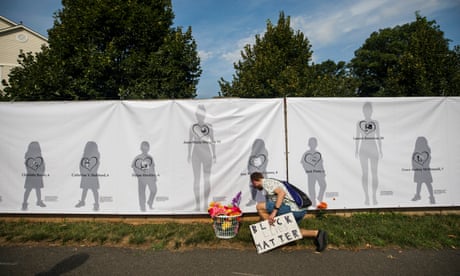When Yvette Felarca exited her flight in Los Angeles, there were a dozen police officers waiting for her.
The 47-year-old teacher was handcuffed, jailed, and later, to her shock, charged with assault, inciting a riot and participating in a riot over her involvement in an
anti-fascist demonstration at the California capitol more than a year ago.
“The charges are obviously politically motivated. It is clearly a witch-hunt,” Felarca told the Guardian in her first interview since she was released Thursday, on $25,000 bail after two nights in jail. “This is in response to the fact that the movement against Donald Trump is strong and the resistance is strong.”
Felarca is one of hundreds of anti-Trump activists across the US facing prosecution for protesting against the White House and
white supremacist and neo-Nazi groups that have increasingly organized in public. The criminal cases – including many in which protesters could face decades in prison – has drawn accusations that the government is trampling on the first amendment and broadly targeting critics in an aggressive effort to silence them.
“We’ve seen a real crackdown on protest and dissent,” said Sam Menefee-Libey, a member of the Dead City Legal Posse, an activist group supporting the more than
200 protesters who were arrested and charged with serious felonies after protesting at Trump’s inauguration. “All branches of the criminal justice system are taking cues from the Trump administration … They’re trying to increase their power and be as punitive as they possibly can be.”
Felarca, a Berkeley teacher and longtime leader with the organization By Any Means Necessary (Bamn), was part of a group of activists gathered in Sacramento, California, on 26 June 2016 to protest a white nationalist rally. The event, organized by the Traditionalist Workers party, which has ties to neo-Nazis and skinheads, quickly devolved into a violent clash between the two sides, leaving seven people
stabbed. One was
affiliated with the Traditionalist Workers.
Shanta Driver, Felarca’s attorney and national chair of Bamn, said the white nationalists were armed aggressors and that police “allowed the Nazis and pro-Trump supporters to bludgeon and stab and cause the hospitalization of unarmed peaceful opponents of Donald Trump”.
Felarca, one of the most
visible counter-protesters, said she was there to oppose the spread of white supremacy and hate speech.
Felarca, whose legal first name is Yvonne, has since been the subject of segments on
Fox News, which has
labeled her a “militant left-wing leader” and posted grainy
footage of her clashes in Sacramento.
Speaking by phone from Los Angeles, Felarca said she was stabbed in the arm and hit in the head, requiring more than 20 stitches. It took her weeks to recover, she said.
A spokeswoman for the Sacramento prosecutor declined to comment on the cases, which were
announced last week, with similar charges filed against two other counter-protesters and a man believed to be
associated with the white nationalists.
The charges against presidential inauguration protesters in particular have raised concerns about the Trump administration targeting critics. The US attorney’s office for Washington DC has
filed a wide range of charges against more than 200 people, including rioting, conspiracy, property destruction and assault on a police officer. Defense attorneys have argued that police
kettled the protesters, essentially trapping and mass-arresting everyone in the area regardless of whether there was any evidence of wrongdoing.
Journalists, legal observers, medics and others were caught up in the arrests, though following
a broad backlash, charges against some members of the media
were dropped. Although 20 cases have been dismissed, most of the charges still stand, with defendants facing up to
75 years in prison.
“It’s a horrible overcharging to assume that 217 people did the exact same thing, and to charge them all with identical conduct flies in the face of common sense,” said Mark Goldstone, an attorney who has represented some of the protesters. “I’ve been doing this for 30-something years and I’ve never seen this happen.”
A spokesman for the US attorney’s office declined to comment.
Prosecutors have offered plea agreements to protesters, which could allow some to avoid prison time in exchange for admitting guilt, but the vast majority have pleaded not guilty and are headed to trial.
“There is no reason why trying to make the world a better place and trying to survive and help people in your community should be a crime,” said Olivia Alsip, a 24-year-old defendant. “I’m not going to plead guilty to anything when I was only trying to help.”
Alsip, a Chicago resident, rejected a deal that would have required her to plead to a misdemeanor, pay a $500 fine, do community service and be on probation.
As the cases drag on, defendants have suffered serious consequences, with some losing their jobs, Menefee-Libey said. Others have struggled to continue their activist work out of fear of jeopardizing their trials.
Erin Lemkey, another Washington DC protester facing decades in prison, said the cases resembled the kind of mass incarceration of activists that occurs in countries like Russia.
“I’m terrified of that happening here,” said the 35-year-old video editor, who lives in New York City. “This is real for a lot of people who do political protests around the world.”
Still, Lemkey said it was important to fight in court to prevent similar prosecutions by the US government moving forward: “They’re using the plea deals as a mechanism to make people submit to the state’s charges and accept their narrative.”

 John Loretz will report on the campaign that led up to the Nuclear Ban Treaty and the upcoming plans to advance nuclear disarmament. John is Program Director of International Physicians for the Prevention of Nuclear War and serves on the steering group of ICAN—the International Campaign to Abolish Nuclear Weapons.
John Loretz will report on the campaign that led up to the Nuclear Ban Treaty and the upcoming plans to advance nuclear disarmament. John is Program Director of International Physicians for the Prevention of Nuclear War and serves on the steering group of ICAN—the International Campaign to Abolish Nuclear Weapons. Ashley Squires—a Masters student in Peace and Conflict studies at UMass Lowell and a Mass. Peace Action intern—attended the Ban Treaty Conference and will give her impressions on the conference and on the prospects for improved US/Russia relations and disarmament.
Ashley Squires—a Masters student in Peace and Conflict studies at UMass Lowell and a Mass. Peace Action intern—attended the Ban Treaty Conference and will give her impressions on the conference and on the prospects for improved US/Russia relations and disarmament. Angela Kim—a senior at Wellesley College and a Mass. Peace Action intern—will speak on the North Korean nuclear issue and on the impact of the 1945 nuclear bombs on Korean conscripted laborers who were working in Hiroshima and Nagasaki at the time.
Angela Kim—a senior at Wellesley College and a Mass. Peace Action intern—will speak on the North Korean nuclear issue and on the impact of the 1945 nuclear bombs on Korean conscripted laborers who were working in Hiroshima and Nagasaki at the time.



The Trump resistance can be best described in one adjective: female